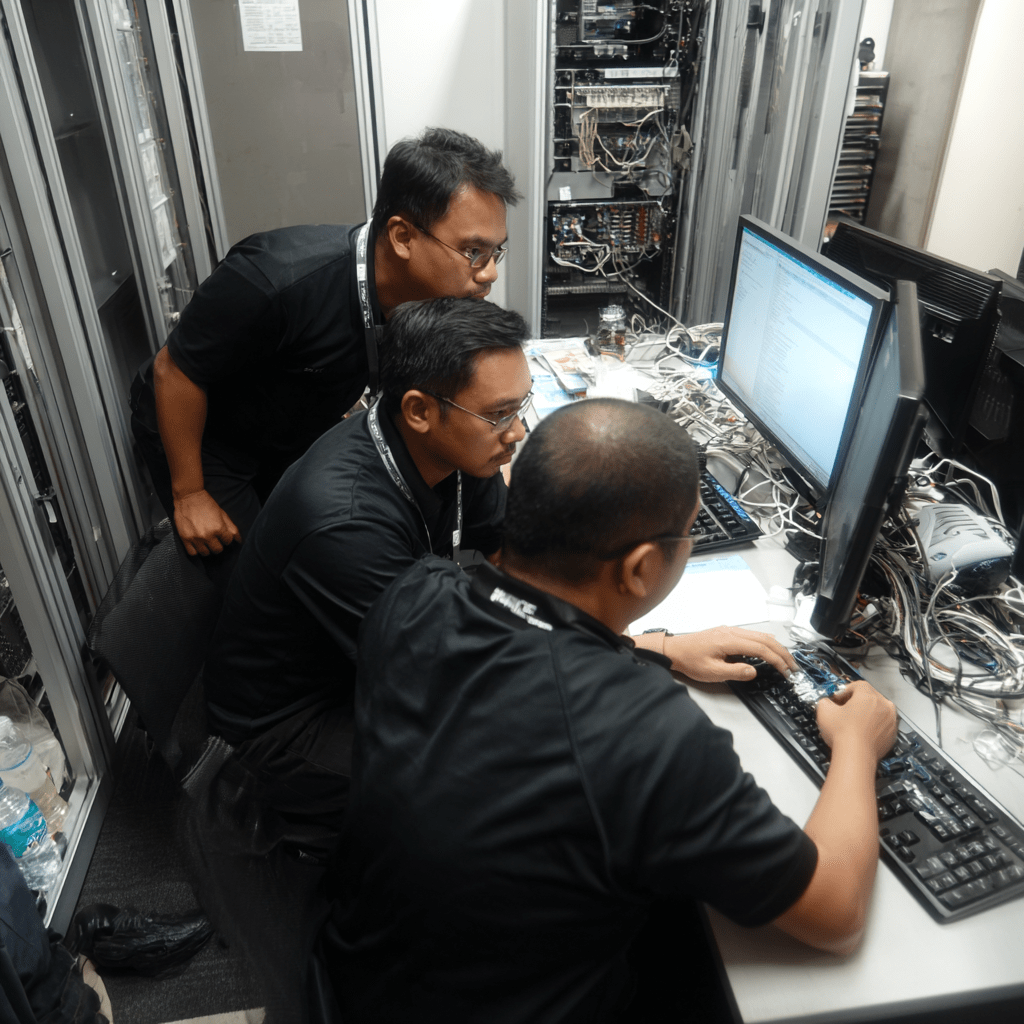Your IT infrastructure doesn’t sleep, and neither do the problems that come with it. Downtime, cyber threats, and network slowdowns can strike at any time, and every minute lost means money out of your pocket.
TahawulTech estimates that the average cost of IT downtime has grown to as much as $9,000 per minute. For smaller businesses, that number may be lower, but the financial and reputational damage can still sting.
The pressure is on your IT team to be available around the clock, to be experts in a dozen different technologies, and to predict problems before they even happen. That’s just not realistic for many organisations. It’s expensive, it’s stressful, and it takes your best people away from the projects that actually drive growth.
Good thing you can avail of outsourced NOC services. Think of them not as a simple support desk, but as your company’s mission control centre. They work silently in the background, 24/7/365, to make sure everything is running smoothly.
In this guide, we’ll break down everything you need to know about it and what you need to consider before you sign on the dotted line when you outsource it.

NOC stands for Network Operations Centre. It’s a centralised location or department where IT specialists monitor, manage, and maintain the health of a company’s network and IT infrastructure.
The term sounds very technical, but the concept is simple. Just as an air traffic controller ensures all flights are moving safely and efficiently, an NOC team ensures your servers, networks, applications, and hardware are all operating as they should.
The team inside an NOC is usually a mix of highly trained engineers and technicians who work in shifts to provide round-the-clock surveillance. They use sophisticated monitoring tools that give them a real-time view of your entire IT environment.
Their primary goal is to spot potential issues. Like a server that’s running hot or an application that’s slowing down, and resolve them before your employees or customers even notice a problem.
What Does an NOC Do?
The responsibilities of an NOC are broad and critical to maintaining a healthy IT environment. Here are the core functions they handle daily:
1. 24/7 Monitoring and Alerting
This is the most fundamental job of an NOC. Their systems constantly monitor every device, server, and application on your network.
They track key performance indicators (KPIs) like CPU usage, memory consumption, bandwidth, and latency.
When any of these metrics cross a pre-set threshold, the system automatically triggers an alert, notifying the NOC technicians immediately.
2. Incident Management and Troubleshooting
When an alert comes in, the NOC team jumps into action. They act as the first line of defence.
Their process is organised: they triage the issue, diagnose the root cause, and begin troubleshooting. They have a playbook for common problems and the expertise to handle more complex ones.
If a solution isn’t found at the first level, they escalate the issue to higher-tier engineers, ensuring the problem gets the attention it needs to be solved quickly.
3. Performance Analysis
NOCs collect and review data over time to look for patterns and trends.
For example, they might notice that your website’s performance drops every Tuesday afternoon. By digging into the data, they can pinpoint the cause, whether it’s a specific database query or a scheduled backup task.
This analysis helps you optimise your systems and prevent recurring problems.

4. Reporting
A good NOC provides regular reports detailing its activities. These reports can show you key metrics like uptime, incident response times, and a summary of all resolved issues.
This transparency helps you see the value they provide and gives you valuable data to make better business decisions.
5. Maintenance and Upgrade
Keeping software and firmware up to date is a full-time job. NOC teams can manage these tasks for you, ensuring that all your systems have the latest patches and security updates.
They can also coordinate planned maintenance windows during off-hours, so your business operations are not impacted.
6. Security Monitoring
Cybersecurity threats are a constant concern. According to Microsoft’s Digital Defense Report, a tremendous 600 million cyber attacks happen each day.
A modern NOC often includes security monitoring as part of its services. They look for suspicious activity, monitor firewall logs, and respond to potential security breaches. This adds a critical layer of protection to your IT infrastructure.
Why Your Business Would Need Outsourced NOC Services
You might be thinking, ‘My internal IT team can handle this.’ And maybe they can, but at what cost?
Here’s a breakdown of the key reasons why so many businesses are outsourcing NOC services:
Access to World-Class Expertise
Most businesses simply cannot afford to have a full-time team of senior-level engineers who are experts in every area, covering networking and servers to virtualisation and security.
An outsourced NOC has a deep bench of specialists. You get access to their collective knowledge and experience for a fraction of the cost.
Cost-Effectiveness
Building and running your own 24/7 NOC is incredibly expensive. You’re looking at salaries for multiple engineers, benefits, overtime, training, software licensing, and equipment.
Genius shared that IT outsourcing can save you up to 85% in operational costs. With a dedicated NOC, you pay a predictable, flat fee that is significantly lower than the cost of an in-house team.

True 24/7/365 Coverage
It’s impossible for a small team to provide continuous coverage without burning out. What happens when your main IT person is on holiday or calls in sick?
An outsourced NOC never sleeps. You can arrange for a team that’s always on duty, ready to respond to any alert at any time, day or night.
Focus on Core Business and Innovation
When your internal IT team is stuck fighting daily fires, they can’t focus on strategic projects that actually move the business forward.
By offloading monitoring and incident response to an external team, you free up your skilled engineers to work on things like cloud migration, new software development, and improving your company’s core technology.
Scalability and Flexibility
You might launch a new product, open a new office, or experience a period of rapid growth. Scaling an in-house IT team is a slow and expensive process.
An outsourced NOC can scale its services up or down to match your needs almost instantly, giving you the flexibility to adapt to changing market conditions.
Questions You Should Ask Yourself and an NOC Outsourcing Provider
Before you even start talking to providers, you need to be clear about your own needs. Here are a few questions to ask yourself:
- What are my biggest IT pain points right now?
- What is my budget for this service?
- What level of uptime do I truly need for my business to function?
- What are my key IT assets that must be monitored?
Once you have those answers, you’re ready to interview potential partners. Here are some of the most important questions you should ask an outsourced NOC provider:
- What is your average response time for a critical alert?
- How do you handle a major, company-wide outage?
- Can you provide me with a sample report so I can see what kind of data you provide?
- What does your onboarding process look like, and how long does it take?
- Can you provide me with a few references from clients in my industry?
- How do you ensure data security and privacy while managing my network?
Improve IT Support by Outsourcing NOC Services

Instead of waiting for things to break, you’ll have a team of experts who are constantly watching your systems, optimising performance, and identifying potential issues before they cause downtime.
By implementing a professional NOC, you’re dramatically reducing the many risks your IT systems could experience. You’d be investing in reliability, security, and the ability of your internal team to focus on innovation.
This peace of mind allows you to concentrate on growing your business and providing the best possible service to your customers, knowing that your IT infrastructure is in expert hands.
FAQs
How does an outsourced NOC differ from managed IT services?
While there is some overlap, an outsourced NOC is a specific part of a managed IT service.
An NOC is focused solely on monitoring and maintaining the health of your IT infrastructure on a 24/7 basis.
Managed IT services are much broader. They can include everything from help desk support to cloud management and strategic IT planning.
How do I know if my business is big enough to need an outsourced NOC?
You don’t have to be a large corporation to benefit. If your business relies on technology for its core operations, whether it’s an e-commerce site, a SaaS platform, or a busy customer service centre, you need to guarantee uptime.
If you don’t have a dedicated in-house team for 24/7 monitoring, or your team is overworked with daily issues, an outsourced NOC can be a perfect fit.
Is an outsourced NOC provider secure?
A professional and reputable outsourced NOC provider is often more secure than an in-house team. They are specialists, and security is a core part of their service.
They use state-of-the-art security protocols, including encrypted connections, strict access controls, and ongoing security audits. Their entire business model depends on protecting your data and your network, so they invest heavily in making sure their systems and processes are completely secure.
It’s always a good idea to ask about their specific security policies during your vetting process.